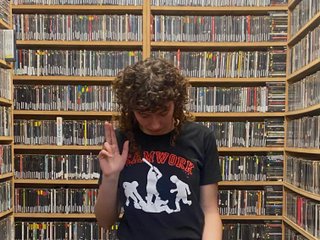Riki Wells is Maschinenkrieger and she thinks ‘Olsen’ by Boards of Canada is the best song in the world.
“If you look at my Last FM, I’ve listened to it over 3000 times. I could sing the whole thing. I could do all the versions of it.”
She’s two EPs deep into her practice – last year’s Maschinenkrieger and the recently released Machine Emptiness. Each sounds quite a bit different, shifting from ambient to something more electronic pop. She joined Pat and I on 704 W High St to discuss the new release as FBi’s latest Independent Artist of the Week.
In many ways, Maschinenkrieger was an inevitable success: “I am proud of myself and proud of my friends. I want to be the master of my own happiness and be able to feel gratitude for being able to create a tangible product.”
Motivation and talent are cast aside in favour of discipline and necessity to change, moving forward with a singular purpose. Riki will kick her feet up and stare you right in the eye when she speaks, unwavering, then break into dance a second later. Confidence and security is a symptom of this condition.
“I knew I wanted to make noise. I’m not going to just have these songs in my head that I can play but not tangibly look at. Production was the sensical way. I had to. There was no choice if I wanted to be able to do what I’m doing.” Riki leans over to show us her bracelet, grinning. It says Rhythm is life.
Outside of Maschinenkrieger, Riki gets involved: dropping piano and picking up drums at 11, learning guitar and bass, and naturally going on to produce music; ‘gifted’ feels like the suitable descriptor. It’s also worth noting a somehow unsurprising fact of childhood past: Riki’s participation in round two of The Voice Kids.
“That’s some crazy lore for you. Pulled up to some building in Zetland and sang the National Anthem…no, it was the Qantas song, ‘I Still Call Australia Home’.”
However, the seeming effortlessness of it all is not to do an injustice or disservice to her persistent practise. She also drums for Demolition Man, and is a producer in collaborative project SWANN, privately messing around with her favourite toy – autotune – and even dipping into coding karaoke. Unlike prior releases, Machine Emptiness prominently features vocals layered over long washing synths and samples, an incredible talent that somehow sits on the backburner but steps forward in her pursuit for self-sustained work.
“I’m not a singer. It’s really difficult being a producer and resigning to the fact that there will always be someone else singing over your beat. It obviously doesn’t have to be that way. If I want to make music for life, then to have a tangible voice that people can attach themselves to is like a stamp – my sigil. It meant that I didn’t have to wait around to find someone who I was happy with singing over my songs. It could just be completely me.”
Singing is a by-product of producing just as producing is a by-product of singing. A formal education in music pushed Riki to pursue both hand-in-hand as a practice made to fulfil a prerequisite, going as far as to accurately recreating tracks from Playboi Carti’s Whole Lotta Red – production, vocals and all. Machine Emptiness can also be credited to two more things: an interface given as a Christmas gift and a deadline. Made over three weekends, culling ten of twelve tracks from a live set, writing three more before tying a bow and calling it. The interface was the limb missing from the machine, finally reunited.
Like with most things, there’s a characteristic sense of symmetry to this electronic release being largely inspired by something analogue, real and tangible. The release was sandwiched by two trips to New Zealand spent by the ocean. Sunsets, sunscreen, swimming. Also watching a lot of movies: Possession (1981), Irma Vep (2022), Demon Lover (2022). There’s a strong sense of extroversion to the entire practice of Maschinenkrieger, however Riki recentres – keeping her head where her feet are.
“I feel inspired by landscapes, like the physical art of being and the world that surrounds me. I’m more influenced by the things that I’m seeing that aren’t human-made.”
Maschinenkrieger is an honest project. Not in the sense of lyrics or concept but in practice – a project that slots into time spent not working, studying or socialising full-time. It’s a straightforward snapshot of effort made with remaining capacity for someone who’s in their early 20s, in bedrooms late at night and to the unromanticised reality of a deadline.
“It’s just not possible to be able to give myself the best of the best, not to say that what I’m making right now isn’t the best of me. It’s just not all-the-time me.”
Yet, Riki is radically unapologetic. When asked what she brings to her projects – clear to anyone else around her – her answer’s meandering for a moment before becoming crystal in conviction:
“I would like to say that I bring a sense of trying something you’ve always wanted to, but maybe haven’t done…filling in the gaps, maybe…I don’t know…I’m thinking about SWANN and how Mona and I get Sayel to push himself lyrically…I feel like, in that project, I bring maybe also a sense of heavy optimism. I’m a hardcore optimist. Actually, I changed my answer. I bring optimism to everything that I’m involved in.”
Words by Rhea Thomas
